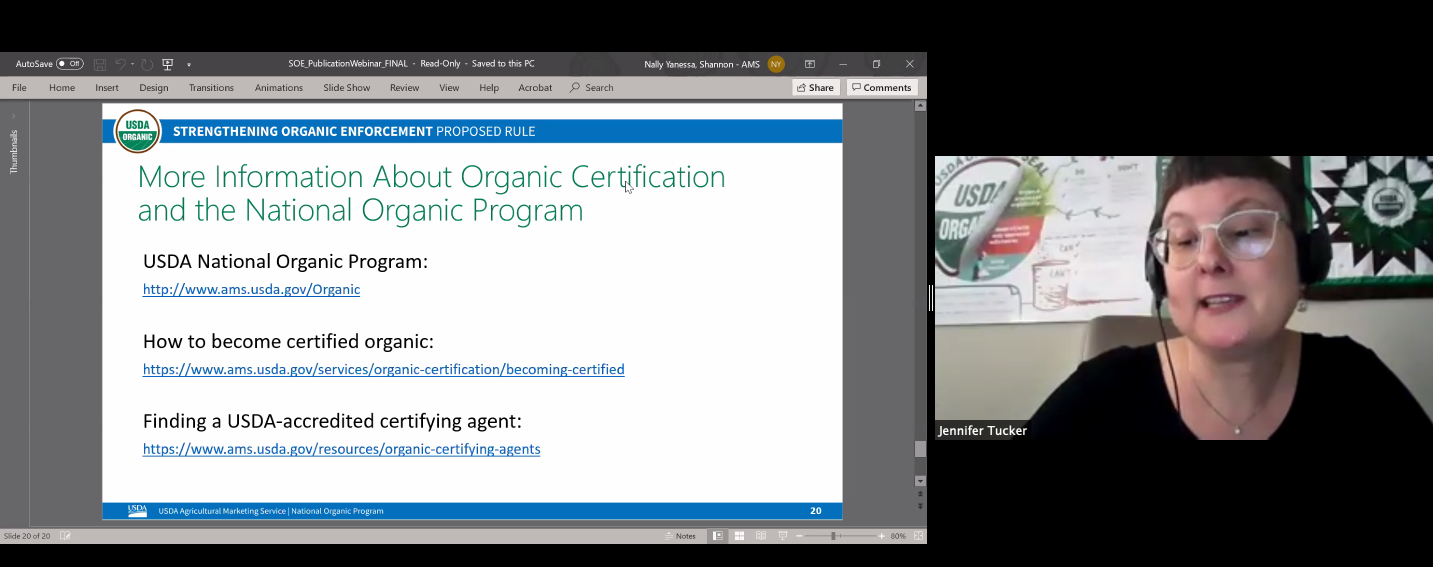
Jul 10, 2020
USDA proposed rule aims to reduce fraud in organic program
USDA officials July 8 gave a first, informal peek at the Strengthening Organic Enforcement rule that’s been in the works for two years, and which they said could reduce fraud in the organic program by half.
“Protecting the integrity of the USDA organic label is a top priority of the National Organic Program,” said Jennifer Tucker, Deputy Administrator of the Agricultural Marketing Service (AMS), which runs the NOP.
A draft copy of the Strengthening Organic Enforcement Proposed Rule was posted online and officials from Agricultural Marketing Service (AMS), which runs the National Organic Program (NOP), held a live webinar that gave attendees some details of the rule. The proposed rule is expected to be published soon in the Federal Register – the exact date wasn’t known at the time of the webinar. A formal 60-day comment period for the industry will follow.
Tucker said that while the rule would change several parts of the existing rules, much of it is based on practices already used in the industry, which doubled in a decade, from 22.1 billion in 2008 sales to $55.1 billion in 2019.
“Organic supply chains have become longer and more complex in response to consumer demand for a broader variety of organic products,” Tucker said. “This complexity sometimes causes organic products to be handled or sold by businesses that are not certified organic. Because the current organic regulations don’t clearly specify which of these businesses need organic certification, some handlers and sellers in the organic supply chain have no oversight from certifiers or the NOP. This hinders product traceability and increases the potential for fraud where non-organic products may be specifically labeled as organic.”
More than 900 attendees logged into the live webinar, Tucker said.
Some of the changes mentioned in the webinar included requiring imported organic products to have traceability back to their port of entry, as well as import certificates. Handlers of organic goods would have new responsibilities.
“The organic seal is a shared responsibility,” Tucker said. “The changes made by SOE impact businesses across the entire organic supply chain, including USDA, our accredited certifiers, organic inspectors wand certified organic operations such as farms and processors. The proposed rule also affects businesses that buy, sell or trade organic products but are not currently certified organic – examples may include brokers, traders, importers and exporters who deal in organic products.”
“Certifiers must identify criteria to identify organic operations and products that may be at high risk of organic fraud. Using these criteria, suppliers must also conduct supply chain audits of high-risk products being certified,” said National Organic Program Standards Division Assistant Director Shannon Nally Yanessa.
Other parts of the proposed rule deal with on-site inspections.
“The proposed rule requires that all certifiers conduct unannounced inspections of at least 5% of the operations they certify annually,” Yanessa said.
When and if the rule is finalized, businesses would likely have a full year to comply with the rule, Tucker said.
A study that AMS had done estimated the effects of the proposed rule. The study estimated that about 2% of all organic sales are fraudulent, and the rule could reduce those sales to 1%. The rule is estimated to provide some $85 million in benefits, with about $7.3 million in costs. In the first year, the rule was expected to raise costs by about $15,100 for each of the country’s 46 accredited certifiers, about $4,900 for each of the roughly 1,000 new handlers, and $60 each for about 25,000 certified operators.
In a released statement, the Organic Trade Association said it welcomed the USDA’s “efforts to boost the integrity of the global organic market,” calling the proposed rule “the largest single piece of rulemaking since the implementation of the National Organic Program regulations.”
Above, Jennifer Tucker, Deputy Administrator of the Agricultural Marketing Service, explains the Strengthening Organic Enforcement Proposed Rule during a July 8 webinar held by the USDA.






